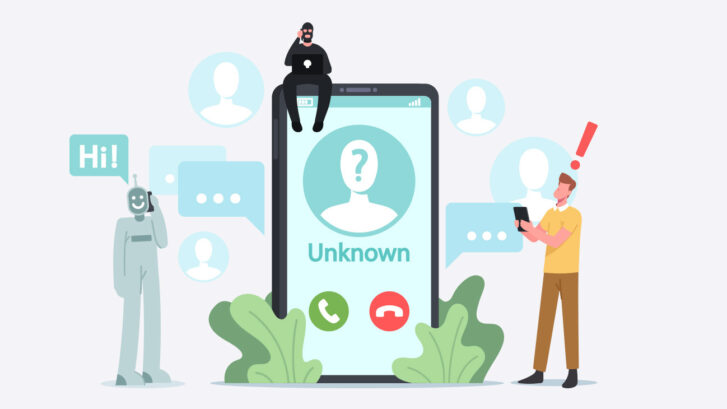There is no doubt that robocalls and spammers are alive and well. YouMail’s Robocall Index posits that 3.8 billion robocalls were made in Jully of 2022—that’s more than 123 million per day and over 5 million per hour. From unknown callers to neighborhood spoofing (fake local numbers), it can be hard to understand who is really on the other end of calls. The Federal Trade Commission notes that “if someone is already breaking the law by robocalling you without permission, there’s a good chance it’s a scam. At the very least, it’s a company you don’t want to do business with…Scammers can fake the name and number that shows up, making it look like a call is from a government agency like the IRS or a local number. That’s called spoofing.” With so much spamming and fraud out there, you’ll want to equip yourself with the right tools to protect your security and identity.
In this article, we cover:
- Everything you need to know about robocalls and scam calls
- Why scam calls are dangerous
- How to protect yourself from spammers
Everything you need to know about robocalls and scam calls
Robocalls and spammers are rampant and show no signs of stopping their annoying and fraudulent behavior. The FTC notes that “if you answer the phone and hear a recorded message instead of a live person, it’s a robocall. If you’re getting a lot of robocalls trying to sell you something, odds are the calls are illegal. Many are also probably scams.” That’s why it’s important to protect your private information and identity. While not every robocall is technically illegal (calls that remind you about a doctor’s appointment, for example), most are illegally trying to steal your personal information to commit various forms of fraud and theft. Ultimately, robocalls are cheap and easy to make from anywhere in the world. That is exactly why the public has seen such a drastic increase in robocalls over the last few years.
Why scam calls are dangerous
Scam calls are dangerous for a multitude of reasons. For one, their end goal is to extract private information from you in order to steal your identity and/or money. In order to achieve that, spammers use various tactics to try and deceive you, such as neighborhood spoofing (where they use a fake local number) or different types of impersonations. The FTC asserts that “you can watch out for common phone scams like government impersonator scams. If someone calls you out of the blue and asks you to hand over personal information or wire money or pay with a gift card, it’s a scam.” With that said, all it takes is for you to say something quickly or give out an unwarranted piece of private information for scammers to get what they need.
How to protect yourself from spammers
There are a number of ways to protect yourself from spammers. The FTC notes that if you suspect you’re getting an unwarranted call from an unknown number that could be a scam call, hang up, don’t press any numbers, and don’t say anything. Ultimately, you shouldn’t pick up calls from numbers that you don’t recognize. In addition, you can report the number on YouMail’s Robocall Index. With YouMail, you’ll be joining the fight to shut down spammers for good. With over 4 billion robocalls made monthly, blocking spammers is YouMail’s #1 priority. At over 140 million robocalls made per day—many of which are endless calls harassing you about your auto warranty—privacy, peace, and quiet can seem like a daunting task. Fortunately, YouMail has your back.
To know exactly who is calling you, download YouMail today.





